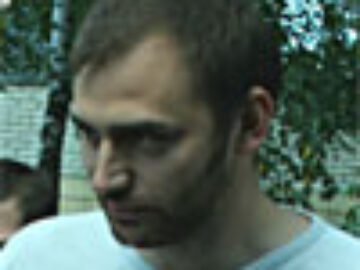Alyaksandr Atroshchankau: “Conditions in Akrestsin Street prison are getting increasingly bad and harsh”

Today an activist of the civil campaign “European Belarus” Alyaksandr Atroshchankau has been released from the prison in Akrestsin Street after a 15-day arrest.
The activist of the “European Belarus” was detained on June 12 during his visit to the KGB directorate for Minsk and Minsk region. For more than a year Alyaksandr Atroshchankau has been seeking return of computers confiscated from his apartment one the eve of the European March held on October 14, 2007 in Minsk. The oppositionist was taken to the court of Tsentralny district of Minsk, and there without witnesses and a lawyer he was sentenced to 15 days of arrest for “contempt of a court” allegedly demonstrated by him on April 22 in the court room of Tsentralny court Alena Illina, who passed a sentence of 1.5 years of colony upon Andrei Kim, and two years of correctional labour and fines to other participants of the protest rally of market vendors held in Minks on January 10.
Alyaksandr Atroshchankau told the Charter’97 press-center about details of the detention and his stay in Akrestsin Street.
– Alyaksandr, how your detention was taking place?
– I was summoned to the KGB allegedly to be asked a few questions about office equipment seized from my place before the European March. I came, but policemen of the Tsentralny police department were waiting for me near the entrance already. I was immediately taken to the police department, and then to the court. Policemen’s actions were extremely swift. I have never seen such things before. In 15 minutes after the detention I was in the police department, and in 25 minutes – in the court.
I was charged with alleged contempt to the court during the trial over participants of the protest rally of market vendors a month before. Though I wasn’t detained formally detained or arrested, my belt and phone were seized in the police department before the trial. The trial was short. I filed a request to involve lawyer Vera Stramkouskaya, but my application was refused. I was defended by a state lawyer who apparently had no experience.
Frankly speaking, after that trial my respect to Belarusian court hasn’t risen. Tatsyana Paulyuchuk convicted me very quickly and without witnesses.
– On the very first day in the detention centre in Akrestsin Street an ambulance was called in to you. What had caused your health problems?
– I developed heart problems. I was sitting in a stuffy, overcrowded ward where everybody was smoking. In the hospital they quickly took readings of equipment, took a blood test, said that I didn’t need hospitalization, and sent me to Akrestsin Street immedietely.
Conditions were very difficult, there were no walks, there was not enough food, and parcels are forbidden as you know. I lost considerable weight. I had to hold my trousers so they wouldn’t fall (a belt and laces are taken from the attested).
There were from 5 to 12 persons in one ward with me. They were very different people, mostly alcoholics, petty hooligans. Some had fits of alcoholic mania. It is hard to stand psychologically.
Absence of walks was one of the most difficult sufferings. It is rather difficult to sit in a stone matchbox for 15 days without walks, both psychologically and physically. You are simply short of fresh air. As time goes by, you start to be lame under the hat, brain is short of oxygen. You read much more slowly.
We were taken to a shower only two times. It is too little, as it was hot at daytime. Search in the ward and personal search were held in the ward four times: everybody goes out of the ward their face to the wall. People are made to put of clothes, shoes, socks…
– Does it mean that incarceration conditions in Akrestsin Street prison haven’t changed?
– Every time I get in prison in Akrestsin Street, conditions are getting increasingly bad and increasingly harsh. Before that I was sitting here in October in the run-up to the European March.
– Your wife Darya Korsak has sent a letter to the OSCE office with a request to visit the detention centre in Akrestsin Street. Should international structures pay attention to the problem of incarceration conditions for political prisoners there?
– Certainly, representatives of international structures should pay serious attention to it. Belarus is an OSCE member, and it should stick to certain rules and agreements. And the OSCE should demand the authorities to do so. Otherwise the role of these structures is not clear. They should pay attention to political prisoners’ incarceration conditions. Moreover, in the run-up to the precedential elections when a risk is high that prisons will be filled with political prisoners as usual.
